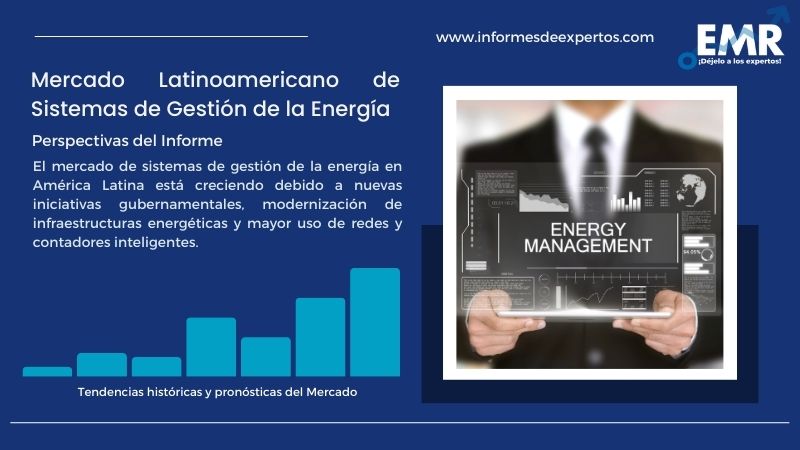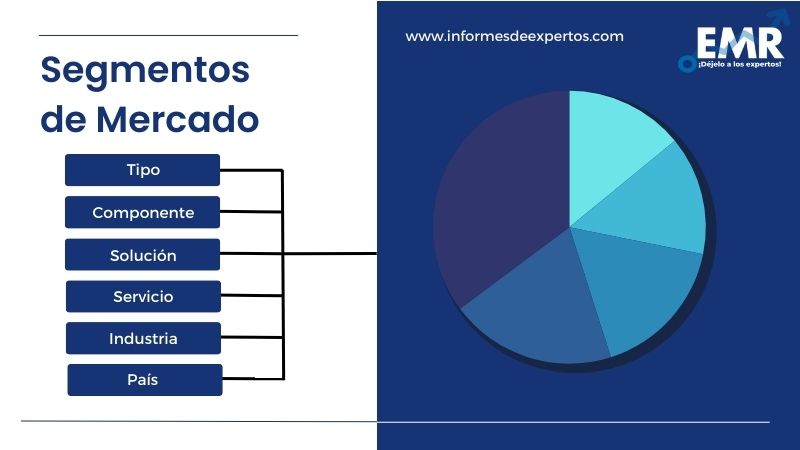Informes

Mercado Latinoamericano de Sistemas de Gestión de la Energía – Por Tipo (EMS para el Hogar, EMS para la Construcción, Otros); Por Componente (Sensor, Software, Otros); Por Solución (Gestión de la Respuesta a la Demanda, Gestión de la Energía del Carbono, Otros); Por Servicio (Supervisión y Control, Implantación e Integración, Otros); Por Industria (Fabricación, Energía y Electricidad, Otros); Por País (Brasil, Argentina, México, Otros); Dinámica del Mercado y Panorama Competitivo
Perspectiva del Mercado Latinoamericano de Sistemas de Gestión de la Energía
El mercado de sistemas de gestión de la energía en América Latina alcanzó un valor de USD 2,85 mil millones en 2025 y se proyecta que se expanda a una CAGR de alrededor del 8,4 % hasta 2035. Con el aumento de los costos energéticos, la adopción de soluciones de eficiencia energética, la integración de energías renovables, la digitalización de infraestructuras industriales y comerciales, y las políticas de sostenibilidad, se espera que el mercado alcance USD 6,38 mil millones para 2035.
Tamaño del Mercado y Pronóstico:
- Tamaño del Mercado en 2025: USD 2,85 mil millones
- Tamaño del Mercado Proyectado en 2035: USD 6,38 mil millones
- Tasa de Crecimiento Anual Compuesta (CAGR) de 2026 a 2035: 8,4%

El sistema de gestión de la energía en América Latina está cobrando impulso, ya que resulta esencial adoptar este sistema para mejorar la eficiencia energética, al tiempo que se reducen los costes, se aumenta la rentabilidad y se respetan los requisitos medioambientales. Gracias a los avances en las tecnologías EMS más recientes, incluido el análisis de pequeñas señales, se ha producido un aumento de los sistemas de eficiencia energética y una disminución de la huella de carbono. Un importante mercado potencial para la globalización de la energía inteligente es América Latina.
Concretamente, Brasil, Argentina, México, Colombia, Chile y Perú son naciones en las que las ventajas de la red inteligente pueden suponer una mejora considerable de la eficiencia y la fiabilidad del suministro energético, así como una distribución equitativa de la energía para todos. El aumento del uso de redes y contadores inteligentes está impulsando el tamaño del mercado de los sistemas de gestión de la energía. Los gobiernos de todo el mundo confían cada vez más en la tecnología de redes inteligentes para actualizar sus anticuadas infraestructuras energéticas debido al aumento del uso de la energía.
Según el componente, el segmento de las soluciones se lleva la mayor cuota de mercado de los sistemas de gestión de la energía, ya que las soluciones permiten recopilar datos importantes y mediciones de energía en tiempo real. También está facilitando una gestión más eficiente de los recursos energéticos. A medida que más países lanzan proyectos de modernización para actualizar sus sistemas de energía, el mercado de soluciones de eficiencia energética se expande. Sin embargo, dado que las principales empresas están eligiendo soluciones de gestión energética de terceros para controlar su energía de forma más eficaz, se prevé que el sector de servicios sea el que más aumente durante el periodo de proyección.
Sistemas de Gestión de la Energía: Segmentación del Mercado

Un sistema de gestión de la energía es una herramienta utilizada por los operadores de redes eléctricas para optimizar, supervisar, controlar y gestionar el rendimiento del sistema de generación o transmisión.
Por tipo, el mercado se segmenta en:
- EMS para el Hogar
- EMS para la Construcción
- EMS Industrial
- Otros
Por componentes, el mercado se divide en:
- Sensor
- Software
- Baterías
- Controlador
- Dispositivos de Visualización
- Otros
El mercado basado en las soluciones puede clasificarse a grandes rasgos en:
- Gestión de la Respuesta a la Demanda
- Gestión de la Energía del Carbono
- Sistema de Facturación e Información al Cliente
Los servicios del sector incluyen:
- Supervisión y Control
- Implantación e Integración
- Consultoría y Formación
- Mantenimiento
Basado en la industria, el mercado se clasifica en:
- Fabricación
- Energía y Electricidad
- Telecomunicaciones y TI
- Sanidad
- Venta al por Menor
- Educación
- Otros
Además, el estudio de IDE analiza el crecimiento del mercado en determinados países latinoamericanos como Brasil, Argentina y México, ya que estas regiones están experimentando un impulso económico.

La modernización y la inversión pública impulsan el mercado latinoamericano de sistemas de gestión de la energía
El uso de redes y medidores inteligentes está impulsando la expansión del mercado. El gobierno se centra en la modernización de los sistemas de energía mediante la adopción de tecnologías de redes inteligentes debido al aumento del consumo de energía y el envejecimiento de la infraestructura eléctrica. La atención de las empresas se centra en las medidas gubernamentales que fomentan el ahorro energético y la escasez de combustibles fósiles. La energía es necesaria para el funcionamiento de cualquier industria, grande o pequeña, por lo que instalar un sistema de gestión energética es crucial.
Varios gobiernos están lanzando iniciativas de modernización para mejorar sus infraestructuras eléctricas. Como resultado, la demanda de soluciones de eficiencia energética está aumentando, lo que impulsa el desarrollo de sistemas de gestión de la energía. Las redes inteligentes se utilizan cada vez más, las normativas gubernamentales más estrictas requieren la conservación de la energía y los avances tecnológicos facilitan la recopilación y el análisis de los datos de uso. Se espera que estos factores aceleren la expansión del mercado durante el periodo de pronóstico.
Actores Clave del Mercado Latinoamericano de Sistemas de Gestión de la Energía
Algunos de los principales actores mundiales son Honeywell International Inc., Mitsubishi Electric Corporation, General Electric Company, Delta Electronics, Inc., ABB Ltd. y Schneider Electric SE entre otros.
Las bases de datos incluidas en el informe sobre el mercado latinoamericano de sistemas de gestión de la energía proporcionan importantes impactos en el desarrollo presentadas por las principales empresas, teniendo en cuenta sus ingresos. Este informe consta de los valores del período histórico (2019-2025) y del período de pronóstico (2026-2035) con patrones de evaluación ampliados que se llevan a cabo mediante el análisis IDE basado en tipo, componente, solución, servicio, industria y país del mercado para determinar el movimiento del estudio.
Además, el proyecto estudiado y analizado se basa en información detallada sobre el modelo de las cinco fuerzas de Porter, las estrategias de los principales actores existentes y sus carteras con diferenciación beneficiosa en innovación de productos en la industria. Por lo tanto, se concluye que el análisis del poder de negociación de los compradores, el poder adquisitivo de los consumidores, la amenaza de los sustitutos y la nueva entrada con el efecto de la reactivación económica y el desarrollo se evalúa para subrayar el poderoso impacto en el mercado.
Preguntas Clave Respondidas en Este Informe:
- ¿Cuál es el rendimiento actual y la trayectoria proyectada del mercado latinoamericano de sistemas de gestión de la energía?
- ¿Cuáles son los principales impulsores, oportunidades y retos para el mercado latinoamericano de sistemas de gestión de la energía?
- ¿Cómo afecta cada impulsor, restricción y oportunidad al mercado latinoamericano de sistemas de gestión de la energía?
- ¿Cuáles son los principales mercados regionales estudiados en el informe?
- ¿Cuál es la región líder en el mercado latinoamericano de sistemas de gestión de la energía?
- ¿Qué factores contribuyen al dominio de esta región en el mercado latinoamericano de sistemas de gestión de la energía?
- ¿Cuál es la tasa de crecimiento histórica del mercado latinoamericano de sistemas de gestión de la energía en los últimos años?
- ¿Cuáles son sus respectivas fortalezas y enfoques de mercado?
- ¿Cómo contribuyen estas empresas a la dinámica general del mercado latinoamericano de sistemas de gestión de la energía?
- ¿Cuál es la estructura competitiva del mercado?
- ¿Quiénes son los principales actores del mercado latinoamericano de sistemas de gestión de la energía?
Beneficios Clave para las Partes Interesadas:
- El informe de la industria de IDE ofrece un análisis cuantitativo exhaustivo de varios segmentos del mercado, las tendencias históricas y actuales del mercado, las previsiones del mercado y la dinámica del mercado latinoamericano de sistemas de gestión de la energía de 2019 a 2035.
- El informe ofrece los datos más recientes sobre los impulsores, retos y oportunidades del mercado. El informe traza los principales mercados regionales, así como los que registran la tasa de crecimiento más rápida. Además, permite a las partes interesadas identificar los principales mercados nacionales de cada región.
- El análisis de las cinco fuerzas de Porter ayuda a las partes interesadas a evaluar el impacto de los nuevos operadores, la rivalidad competitiva, el poder del proveedor, el poder del comprador y la amenaza de sustitución. Ayuda a las partes interesadas a analizar el nivel de competencia en la industria de latinoamericano de sistemas de gestión de la energía y su atractivo.
- El panorama competitivo permite a las partes interesadas comprender su entorno competitivo y ofrece una visión de las posiciones actuales de los principales actores del mercado.
Alcance del Mercado:
|
Características del Informe |
Detalles |
|
Año Base de la Estimación: |
2025 |
|
Datos Históricos: |
2019-2025 |
|
Datos de Pronóstico: |
2026-2035 |
|
Alcance del Informe: |
Tendencias Históricas y Previsiones del Mercado, Impulsores y Limitantes de
|
|
Desglose por Tipo: |
|
|
Desglose por Componente: |
|
|
Desglose por Solución: |
|
|
Desglose por Servicio: |
|
|
Desglose por Industria: |
|
|
Desglose por País: |
|
|
Dinámica del Mercado: |
|
|
Panorama Competitivo: |
|
|
Empresas Cubrietas: |
|
*En Informes de Expertos siempre nos esforzamos por brindarle la información más reciente. Los números de artículo son solo indicativos y pueden diferir del informe real.
Language of the Report – English
Sin embargo, el informe puede estar disponible en español por un costo adicional.
1 Preface
2 Report Coverage – Key Segmentation and Scope
3 Report Description
3.1 Market Definition and Outlook
3.2 Properties and Applications
3.3 Market Analysis
3.4 Key Market Players
4 Key Assumptions
5 Executive Summary
5.1 Overview
5.2 Key Drivers
5.3 Key Developments
5.4 Competitive Structure
5.5 Key Industrial Trends
6 Snapshot
6.1 Latin America
6.2 By Country
7 Industry Opportunities and Challenges
8 Latin America Energy Management Systems Market Analysis
8.1 Key Industry Highlights
8.2 Latin America Energy Management Systems Historical Market (2019-2025)
8.3 Latin America Energy Management Systems Market Forecast (2026-2035)
8.4 Latin America Energy Management Systems Market by Type
8.4.1 Home EMS
8.4.1.1 Market Share
8.4.1.2 Historical Trend (2019-2025)
8.4.1.3 Forecast Trend (2026-2035)
8.4.2 Building EMS
8.4.2.1 Market Share
8.4.2.2 Historical Trend (2019-2025)
8.4.2.3 Forecast Trend (2026-2035)
8.4.3 Industrial EMS
8.4.3.1 Market Share
8.4.3.2 Historical Trend (2019-2025)
8.4.3.3 Forecast Trend (2026-2035)
8.4.4 Others
8.5 Latin America Energy Management Systems Market by Component
8.5.1 Sensor
8.5.1.1 Market Share
8.5.1.2 Historical Trend (2019-2025)
8.5.1.3 Forecast Trend (2026-2035)
8.5.2 Software
8.5.2.1 Market Share
8.5.2.2 Historical Trend (2019-2025)
8.5.2.3 Forecast Trend (2026-2035)
8.5.3 Batteries
8.5.3.1 Market Share
8.5.3.2 Historical Trend (2019-2025)
8.5.3.3 Forecast Trend (2026-2035)
8.5.4 Controller
8.5.4.1 Market Share
8.5.4.2 Historical Trend (2019-2025)
8.5.4.3 Forecast Trend (2026-2035)
8.5.5 Display Devices
8.5.5.1 Market Share
8.5.5.2 Historical Trend (2019-2025)
8.5.5.3 Forecast Trend (2026-2035)
8.5.6 Others
8.6 Latin America Energy Management Systems Market by Solution
8.6.1 Demand Response Management
8.6.1.1 Market Share
8.6.1.2 Historical Trend (2019-2025)
8.6.1.3 Forecast Trend (2026-2035)
8.6.2 Carbon Energy Management
8.6.2.1 Market Share
8.6.2.2 Historical Trend (2019-2025)
8.6.2.3 Forecast Trend (2026-2035)
8.6.3 Utility Billing and Customer Information System
8.6.3.1 Market Share
8.6.3.2 Historical Trend (2019-2025)
8.6.3.3 Forecast Trend (2026-2035)
8.7 Latin America Energy Management Systems Market by Services
8.7.1 Monitoring and Control
8.7.1.1 Market Share
8.7.1.2 Historical Trend (2019-2025)
8.7.1.3 Forecast Trend (2026-2035)
8.7.2 Implementation and Integration
8.7.2.1 Market Share
8.7.2.2 Historical Trend (2019-2025)
8.7.2.3 Forecast Trend (2026-2035)
8.7.3 Consulting and Training
8.7.3.1 Market Share
8.7.3.2 Historical Trend (2019-2025)
8.7.3.3 Forecast Trend (2026-2035)
8.7.4 Maintenance
8.7.4.1 Market Share
8.7.4.2 Historical Trend (2019-2025)
8.7.4.3 Forecast Trend (2026-2035)
8.8 Latin America Energy Management Systems Market by Industry
8.8.1 Manufacturing
8.8.1.1 Market Share
8.8.1.2 Historical Trend (2019-2025)
8.8.1.3 Forecast Trend (2026-2035)
8.8.2 Power and Energy
8.8.2.1 Market Share
8.8.2.2 Historical Trend (2019-2025)
8.8.2.3 Forecast Trend (2026-2035)
8.8.3 Telecom and IT
8.8.3.1 Market Share
8.8.3.2 Historical Trend (2019-2025)
8.8.3.3 Forecast Trend (2026-2035)
8.8.4 Healthcare
8.8.4.1 Market Share
8.8.4.2 Historical Trend (2019-2025)
8.8.4.3 Forecast Trend (2026-2035)
8.8.5 Retail
8.8.5.1 Market Share
8.8.5.2 Historical Trend (2019-2025)
8.8.5.3 Forecast Trend (2026-2035)
8.8.6 Education
8.8.6.1 Market Share
8.8.6.2 Historical Trend (2019-2025)
8.8.6.3 Forecast Trend (2026-2035)
8.8.7 Others
8.9 Latin America Energy Management Systems Market by Country
8.9.1 Market Share
8.9.1.1 Brazil
8.9.1.2 Argentina
8.9.1.3 Mexico
8.9.1.4 Others
9 Regional Analysis
9.1 Brazil
9.1.1 Historical Trend (2019-2025)
9.1.2 Forecast Trend (2026-2035)
9.2 Argentina
9.2.1 Historical Trend (2019-2025)
9.2.2 Forecast Trend (2026-2035)
9.3 Mexico
9.3.1 Historical Trend (2019-2025)
9.3.2 Forecast Trend (2026-2035)
10 Market Dynamics
10.1 SWOT Analysis
10.1.1 Strengths
10.1.2 Weaknesses
10.1.3 Opportunities
10.1.4 Threats
10.2 Porter’s Five Forces Analysis
10.2.1 Supplier’s Power
10.2.2 Buyers Powers
10.2.3 Threat of New Entrants
10.2.4 Degree of Rivalry
10.2.5 Threat of Substitutes
10.3 Key Indicators for Demand
10.4 Key Indicators for Price
11 Value Chain Analysis
12 Competitive Landscape
12.1 Market Structure
12.2 Key Company Profiles
12.2.1 Honeywell International Inc.
12.2.1.1 Company Overview
12.2.1.2 Product Portfolio
12.2.1.3 Demographic Reach and Achievements
12.2.1.4 Certifications
12.2.2 Mitsubishi Electric Corporation
12.2.2.1 Company Overview
12.2.2.2 Product Portfolio
12.2.2.3 Demographic Reach and Achievements
12.2.2.4 Certifications
12.2.3 General Electric Company
12.2.3.1 Company Overview
12.2.3.2 Product Portfolio
12.2.3.3 Demographic Reach and Achievements
12.2.3.4 Certifications
12.2.4 Delta Electronics, Inc.
12.2.4.1 Company Overview
12.2.4.2 Product Portfolio
12.2.4.3 Demographic Reach and Achievements
12.2.4.4 Certifications
12.2.5 ABB Ltd.
12.2.5.1 Company Overview
12.2.5.2 Product Portfolio
12.2.5.3 Demographic Reach and Achievements
12.2.5.4 Certifications
12.2.6 Schneider Electric SE
12.2.6.1 Company Overview
12.2.6.2 Product Portfolio
12.2.6.3 Demographic Reach and Achievements
12.2.6.4 Certifications
12.2.7 Others
13 Industry Events and Developments
¿Cuál fue el tamaño del mercado de sistemas de gestión de la energía en 2025?
El mercado alcanzó un valor aproximado de USD 2,85 mil millones en 2025.
¿Cuál es la tasa de crecimiento del mercado de sistemas de gestión de la energía?
Se estima que el mercado crezca a una TCAC de 8,40%. entre 2026 y 2035.
¿Cuáles son los principales factores que impulsan el crecimiento del mercado?
Los principales factores que impulsan el mercado latinoamericano de sistemas de gestión de la energía son el aumento de la concienciación sobre la eficiencia energética, los avances tecnológicos y la integración del hogar inteligente.
¿Cómo se segmenta el mercado según la industria?
Según la industria, el mercado se segmenta en fabricación, electricidad, energía, telecomunicaciones, TI, sanidad, comercio minorista y educación, entre otros.
¿Cuáles son los principales componentes de los sistemas de gestión de la energía?
Los principales componentes de los sistemas de gestión de la energía son los sensores, el software, las baterías, el controlador y los dispositivos de visualización, entre otros.
¿Cuáles son los principales países incluidos en el informe de mercado?
Brasil, México y Argentina son los principales países incluidos en el informe de mercado.
¿Quiénes son los actores clave en el mercado de sistemas de gestión de la energía?
Los actores clave del mercado son Honeywell International Inc., Mitsubishi Electric Corporation, General Electric Company, Delta Electronics, Inc., ABB Ltd. y Schneider Electric SE, entre otros.
¿Cuál es la perspectiva prevista para el mercado de sistemas de gestión de la energía en América Latina para 2026–2035?
Se proyecta que el mercado crezca de forma constante durante el período de pronóstico 2026–2035, impulsado por la eficiencia energética y la integración de energías renovables, alcanzando aproximadamente USD 6,38 mil millones para 2035.
Excel Data Set
USD1799
-
Datos completos en formato Excel para un usuario
-
Impresión no permitida
-
Entrega por Email
-
Personalización limitada gratuita (pre-venta)Soporte de analista post ventaDescuento del 50% en la Próxima ActualizaciónUsuario Único
USD3199
USD2999-
Restringido a un usuario
-
Solo una impresión
-
Disponible en PDF
-
Personalización limitada gratuita (pre-venta)Soporte de analista post ventaDescuento del 50% en la Próxima ActualizaciónCinco Usuarios
USD4199
USD3999-
Restringido a cinco usuarios
-
Una impresión por usuario
-
Disponible en PDF
-
Personalización limitada gratuita (pre-venta)
-
Soporte de analista post venta
-
Descuento del 50% en la Próxima Actualización
Multiusuario
USD5199
USD4999-
Usuarios ilimitados dentro de la organización
-
Impresiones ilimitadas
-
Disponible en PDF
-
Personalización limitada gratuita (pre-venta)
-
Soporte de analista post venta
-
Descuento del 50% en la Próxima Actualización
Póngase en Contacto¿Cualquier Pregunta? Hable con un Analista
Solicitar una MuestraVer una Muestra
Solicitar PersonalizaciónSe le olvidó algo? Pregunte Ahora
¿Por qué Informes de Expertos?La Gente Adecuada
Somos técnicamente excelentes, estratégicos, prácticos, experimentados y eficientes; nuestros analistas son cuidadosamente seleccionados en función de tener los atributos correctos para trabajar con éxito y ejecutar proyectos basados en sus expectativas.
Metodología Correcta
Aprovechamos nuestra tecnología de vanguardia, nuestro acceso a bases de datos confiables y nuestro conocimiento de los modelos actuales utilizados en el mercado para ofrecerle soluciones de investigación que se adapten a sus necesidades y lo pongan a la vanguardia.
Precio Justo
Realizamos una investigación exhaustiva y de calidad superior a precios razonables, inigualables y que demuestran nuestra comprensión de su estructura de recursos. Además, ofrecemos descuentos atractivos en nuestros próximos informes.
Apoyo Adecuado
Nuestro equipo de analistas expertos está a su disposición entera para ofrecerle resultados óptimos personalizados para satisfacer sus necesidades precisas dentro del plazo especificado y ayudarlo a comprender mejor la industria.
Informes SimilaresEl mercado de sistemas de gestión de energía en México alcanzó un valor de 1,60 mil millones de USD en 2025 y, con una tasa compuesta de crecimiento anual del 12,3 %, alcanzará un valor de 5,11 m...
El tamaño del mercado de compresores centrífugos en México fue valorado en 184,73 millones de USD en 2025. Se proyecta que el mercado experimente una tasa de crecimiento anual compuesta (CAGR) del ...
El mercado de las barras colectoras crece a un ritmo exponencial debido a la creciente demanda de electricidad en los sectores comercial y residencial.
El mercado de sistemas de gestión energética alcanzó USD 72,33 mil millones en 2025 y crecerá a una CAGR del 14,00% hasta USD 268,14 mil millones en 2035.
El mercado de servicios petroleros alcanzó USD 331,91 mil millones en 2025 y se prevé que crezca a una CAGR del 6,50% hasta USD 623,04 mil millones en 2035.
Newsletter





